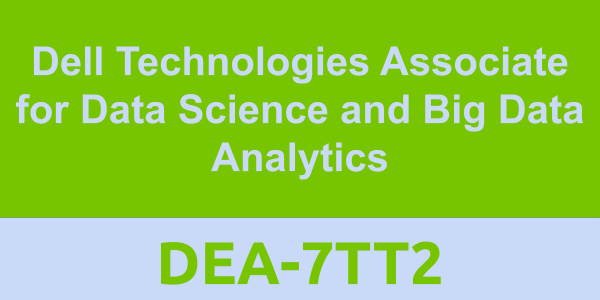This exam focuses on the practice of data analytics, the role of the Data Scientist, the main phases of the Data Analytics Lifecycle, analyzing and exploring data with R, statistics for model building and evaluation, the theory and methods of advanced analytics and statistical modeling, the technology and tools that can be used for advanced analytics, operationalizing an analytics project, and data visualization techniques. Successful candidates will achieve the Dell EMC Proven Professional – Data Science Associate credential.
Dell Technologies provides free practice tests to assess your knowledge in preparation for the exam. Practice tests allow you to become familiar with the topics and question types you will find on the proctored exam. Your results on a practice test offer one indication of how prepared you are for the proctored exam and can highlight topics on which you need to study and train further. A passing score on the practice test does not guarantee a passing score on the certification exam.
Dell Technologies DEA-7TT2 Exam Summary:
| Exam Name | Dell Technologies Associate for Data Science and Big Data Analytics |
| Exam Code | DEA-7TT2 |
| Exam Price | $230 (USD) |
| Duration | 90 mins |
| Number of Questions | 60 |
| Passing Score | 60% |
| Books / Training | Associate - Data Science and Big Data Analytics Training |
| Sample Questions | Data Science and Big Data Analytics Associate Certification Sample Question |
| Practice Exam | Data Science and Big Data Analytics Associate Certification Practice Exam |
Dell Technologies DEA-7TT2 Exam Topics:
| Topic | Details | Weights |
| Big Data, Analytics, and the Data Scientist Role | - Define and describe the characteristics of Big Data - Describe the business drivers for Big Data analytics and data science - Describe the Data Scientist role and related skills |
5% |
| Data Analytics Lifecycle | - Describe the data analytics lifecycle purpose and sequence of phases - Discovery - Describe details of this phase, including activities and associated roles - Data preparation - Describe details of this phase, including activities and associated roles - Model planning - Describe details of this phase, including activities and associated roles - Model building - Describe details of this phase, including activities and associated roles |
8% |
| Initial Analysis of the Data | - Explain how basic R commands are used to initially explore and analyze the data - Describe and provide examples of the most important statistical measures and effective visualizations of data - Describe the theory, process, and analysis of results for hypothesis testing and its use in evaluating a model |
15% |
| Advanced Analytics - Theory, Application, and Interpretation of Results for Eight Methods | Describe theory, application, and interpretation of results for the following methods: - K-means clustering - Association rules - Linear regression - Logistic Regression - Naïve Bayesian classifiers - Decision trees - Time Series Analysis - Text Analytics |
40% |
| Advanced Analytics for Big Data - Technology and Tools | - Describe the technological challenges posed by Big Data - Describe the nature and use of MapReduce and Apache Hadoop - Describe the Hadoop ecosystem and related product use cases - Describe in-database analytics and SQL essentials - Describe advanced SQL methods: window functions, ordered aggregates, and MADlib |
22% |
| Operationalizing an Analytics Project and Data Visualization Techniques | - Describe best practices for communicating findings and operationalizing an analytics project - Describe best practices for building project presentations for specific audiences - Describe best practices for planning and creating effective data visualizations |
10% |





0 comments:
Post a Comment